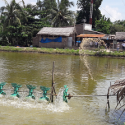How is innovation in aquaculture conceptualized and managed?

Olivier M. Joffre, Laurens Klerkx, Malcolm Dickson and Marc Verdegem published a research article in the December 2016 Special Issue of Aquaculture “Emerging Trends in Aquaculture Value Chain”, entitled “How is innovation in aquaculture conceptualized and managed? A systematic literature review and reflection framework to inform analysis and action”. The article was written in the framework of the Global Challenges Programme project “Nutritious-system pond farming in Vietnam” executed by main project partners WorldFish, Skretting-Vietnam, Can Tho University and Wageningen University & Research.
Please find below the abstract of of this open access publication and a link to the full research article.
Abstract
Aquaculture has experienced spectacular growth in the past decades, during which continuous innovation has played a significant role, but it faces increasing criticism regarding its ecological and social sustainability practices and the resulting challenges for future innovation processes. However, in the aquaculture literature, there is limited systematic knowledge of how innovation has been approached in terms of how the focus and the scope of aquaculture innovation processes are understood and managed. The objective of this paper is therefore to analyse the different approaches to innovation used in aquaculture development. We conducted a systematic review of the aquaculture literature, using an analytical lens derived from three main bodies of literature on approaches to conceptualize and manage innovation: Technology-driven, Systemic, and Business and Managerial approaches to innovation. One hundred publications were selected from the aquaculture literature covering the topic of aquaculture innovation. Analysis identified the Transfer of Technology approach as still the predominant approach to aquaculture innovation; and, even with the integration of elements of Systemic approaches, most studies remain focused on the farm level and are technology driven. Multi-dimensional studies, integrating technical, biophysical, political, and institutional dimensions of innovation in aquaculture were found, but studies analysing interactions between levels remain scarce, have a strong emphasis on the institutional dimension, and lack focus on the management of the innovation process. Studies with cross-fertilizations between different approaches to aquaculture innovation are limited but address specific research questions regarding the extent to which specific target groups are included in interventions and the need to incorporate diverse dimensions in analysing innovation processes. Our analysis suggests that aquaculture research and technology design that feeds into aquaculture innovation could benefit from innovation management approaches that integrate constant feedback from users, especially when specific groups are being targeted for better inclusiveness, and thus could better foster multi-directional interactions between multiple actors connected to aquaculture systems. This would help to elevate the analysis from just the farm and improve the integration of institutional, political, economic, and socio-cultural dimensions for better management of the innovation process. The study of aquaculture innovation needs to take into consideration the important role of private sector actors and make better use of systemic approaches to further elucidate the multi-dimensional and multi-level interplays in complex aquaculture systems. Ultimately, interdisciplinary research on aquaculture innovation could deliver significant insights supporting the development of a resilient and sustainable aquaculture sector.
Statement of relevance
Using an analytical lens derived from the literature on innovation approaches, this study systematically analyses approaches to innovation used in aquaculture development. We identify the main trends and existing gaps in aquaculture innovation research and then discuss the potential complementarities between different approaches to innovation in order to better understand and support innovation in the aquaculture sector.






